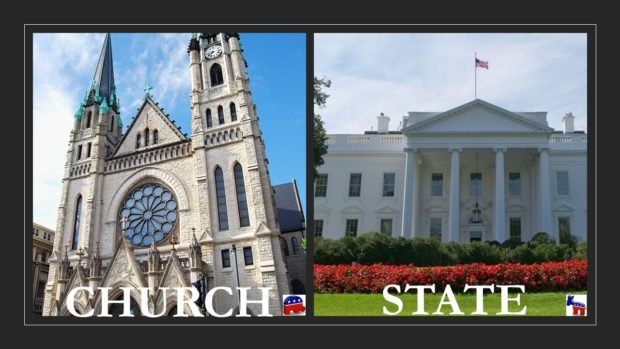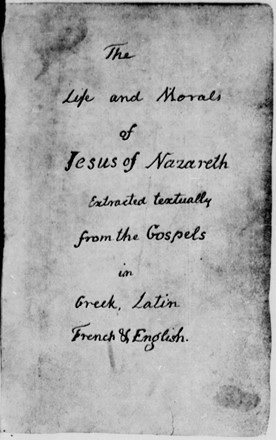A Wall of Separation between Church and State

Jefferson’s “Wall of Separation” was not intended to sever all ties between Church and State. Rather, our Founding Fathers encouraged this relationship.
Our Founding Fathers did not intend for government to be rid of religion. On the contrary, they encouraged religion. Case in point, in his 1796 Farewell Address, George Washington asserts, “Reason and experience both forbid us to expect that national morality can prevail in exclusion of religious principle.” Democrats such as Joe Biden, invoke the separation of church and state when it is politically expedient, as it is when it concerns Planned Parenthood or pro-choice activism. Joe claims he cannot impose his beliefs on others. Therefore, funding an organization that goes against his supposed fundamental beliefs of a right to life, poses no personal moral conflict as a representative of the people in government.
That last point will be expounded upon shortly. But first, a brief digression into U.S. History might prove enlightening. Thomas Jefferson was a prolific writer. He amassed a collection of thousands of writings in his lifetime. He is considered by some to be among the least religious of the Founding Fathers. But this ignores certain facts about Jefferson’s life. For instance, Jefferson regularly attended religious services at a church at the bottom of Capitol-hill during his presidency. In fact, Jefferson regularly attended services in the Hall of Representatives when that became a custom. Moreover, those religious services were held weekly at the U.S. Capitol from 1795 until after the Civil War. Historian David Barton notes in, Original Intent (a great resource), that these religious services were “regularly attended by U.S. Presidents, Senators, and Representatives.” This falls perfectly in-line with the Founder’s intent, as Noah Webster noted. Webster writes, “When you become entitled to exercise the right of voting for public officers, let it be impressed on your mind that God commands you to choose for rulers just men who will rule in the fear of God.”
Some claim Jefferson did not believe in miracles because he cutout all of Jesus’ miracles from the Bible to create his own bible, the infamous Jefferson Bible. What is left out, as noted in the introduction to this work, is that Jefferson’s original intent in compiling the work in this way was to make it more suitable for sharing the life and teachings of Jesus with Indians. Later, he decided this effort to be for his “own satisfaction;” noting he wanted to leave out details of Jesus’ “personal history and character,” to focus on his teachings. Jefferson wrote about this in a letter to Joseph Priestley, written on 29 January, 1804. Moreover, Jefferson did not claim this to be his bible. He named the title of this work, “The Life and Morals of Jesus of Nazareth.”

Notwithstanding, Barton notes that it was an exchange of letters between Thomas Jefferson and the Baptist Association of Danbury, CT that has caused an uproar. Jefferson had recently been elected president and the Danbury church mailed a letter congratulating him and expressing concern over the security of their religious freedoms. They did not believe the Constitution was specific enough in protecting their freedoms and argued government seemed to be granting these rights rather than these being inalienable rights. Jefferson wrote back, assuring them they did not need to fear interference from government in exercising their religious freedoms. Jefferson quoted the First Amendment and assured them this was kindred to “a wall of separation between Church and State.” Jefferson asserted in that letter that the Constitution restores to man “all his natural rights.” Natural rights, “by definition,” asserts historian David Barton via the work of Richard Hooker, were composed of “that which the Books of the Law and the Gospel do contain.” Clearly, Jefferson viewed God as the “Author and Source” of our inalienable rights, which include religious expression. Furthermore, Barton notes, the wall of separation used by Jefferson was “not to limit religious activities in public; rather they were to limit the power of the government to prohibit or interfere with those expressions.”
Jefferson’s “wall of separation” worked its way into the Supreme Court in the 1878 Reynolds v. United States case, where the Court upheld the meaning as described above. It was not until racist FDR appointee, and active member of the Ku Klux Klan, Justice Hugo Black, that Jefferson’s “wall of separation” became a permanent and progressively infringing part of Constitutional jurisprudence. In the 1947 Everson v. Board of Education of the Township of Ewing case, Black wrote, “Neither a state nor the Federal Government can, openly or secretly, participate in the affairs of any religious organizations or groups, and vice versa. In the words of Jefferson, the clause against establishment of religion by law was intended to erect ‘a wall of separation between church and State.’” This was pure judicial activism. Thomas Jefferson was very clear on how the Constitution ought to be interpreted. In an 1823 letter to Justice William Johnson, Jefferson asserts, “On every question of construction, carry ourselves back to the time when the Constitution was adopted, recollect the spirit manifested in the debates, and instead of trying what meaning may be squeezed out of the text, or invented against it, conform to the probable one in which it was past.”
In the 1971 Lemon v. Kurtzman case, the Supreme Court used the Everson “wall” to solidify the claim that there needed to be a “secular purpose” test to rule for or against a case. In the 1985 Wallace v. Jaffree case, the Supreme Court used the “secular purpose” test to prohibit school prayers in public schools. This limited review of Supreme Court activism makes a case for the need to take back the rights lost by big government and elect virtuous statesmen who cherish the foundations of our government and its biblical principles, as Webster implored. Psalm 11:3 warns: “If the foundations be destroyed, what can the righteous do?”
Progressives have been making constant progress away from the principles of the founding. The Supreme Court has been a major culprit by forcing predetermined outcomes from meaning that has been “squeezed out” or “invented” against the written Constitution. The founders did not want a Theocracy, but they nevertheless contended that without morality and religion, our nation would perish. A relationship, rather than a separation, between church and state, brings hope to the future of our nation.
Returning to Joe’s argument, the Constitution does not guarantee a right to an abortion, much less the funding to perform one. Religion, a right protected by the Constitution, is not funded by taxpayers. Why then, would government fund murder? The reason for this is not too difficult to discern. The Founding Fathers were clear on this topic. As described above and noted by historian David Barton, George Washington considered religion and morality to be “indispensable supports for good government, political prosperity, and national well-being.” President John Adams noted that our government, or that of any other, lacks the “power capable of contending with human passions unbridled by morality and religion.” He concludes, “Our Constitution was made only for a moral and religious people. It is wholly inadequate to the government of any other.” Amen!




